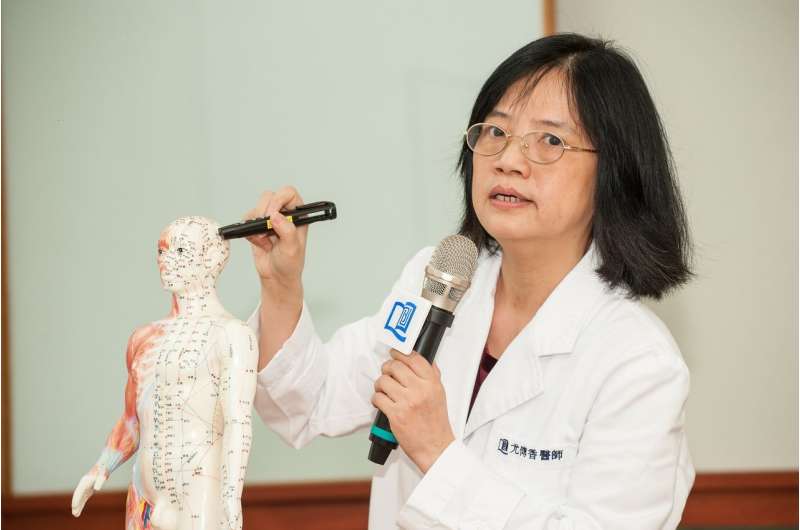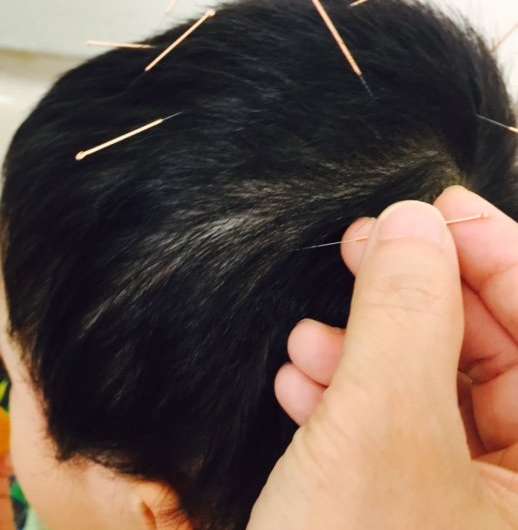Clinical study finds scalp acupuncture effective for treating autistic children

The School of Chinese Medicine (SCM) of Hong Kong Baptist University (HKBU) conducted a clinical observation of scalp acupuncture treatment for 68 children with autism. The findings indicated that 66 patients have shown improvements after treatment, resulting in an overall efficacy rate of 97%. The treatment was found to be more effective in younger children.
Autism Spectrum Disorder is a disorder of brain neural development. The majority of the autistic patients developed significant impaired social interaction, verbal communication delay and behavioural disorder before the age of three. The effect of medication on improving the language, behavioural and communication abilities of the autistic patients is limited.
Between May 2010 and June 2013, Ms Ann Yau, Lecturer of SCM's Division of Continuing and Professional Education, attended to the 68 autistic patients at the HKBU Chinese medicine clinics, comprising 57 boys and 11 girls aged between 2 and 10. She performed on each of the patients a course of scalp acupuncture comprising 30 bi-weekly sessions over a period of 15 weeks.
Among the 68 autistic children, 47 are diagnosed to be suffering from "natal autism", i.e. they have shown abnormal social development and speech delay in the first one or two years after birth, while 21 are diagnosed with "regressive autism", i.e. they have normal development in the first one or two years after birth but have gradually lost the previously acquired skills and started to show symptoms of autism.
Ms Yau selected five of the most common symptoms of autism as assessment criteria: impaired social interaction, delayed verbal communication, behavioural problems, noise sensitivity and food selectivity. The young patients were given a rating for each of the symptoms, the higher the score, the more serious the symptom is. The data were compared and analysed before and after the treatment programme.

The findings of the clinical observation revealed that the treatment has significant effect on 51 patients (75%) whose symptoms have been reduced significantly; the treatment is effective for 15 patients (22%); and ineffective for two patients (3%), giving rise to an overall efficacy rate of 97%.
For the natal autistic patients, decreases were registered in the total score of each of the symptoms: a drop of 34.8% in delayed verbal communication, 37.9% in impaired social interaction, 27.6% in behavioural problems, 21.8% in food selectivity, and 17.2% in noise sensitivity.
The children with regressive autism also recorded decreases in the symptoms: a decrease of 31.4% in impaired social interaction, 32.8% in delayed verbal communication, 21.4% in noise sensitivity, 23.4% in behavioural problems, and 30.9% in food selectivity.
Ms Yau said that after the treatment the patients showed more notable improvements in social interaction and verbal communication than in behaviours, noise sensitivity and food selectivity. Moreover, the earlier the children receive acupuncture therapy, the higher the effectiveness. This therapy is also more effective for natal autistic patients than patients with regressive autism.
The observation also studied the percentage of patients with allergic diseases and the percentage of their family members with allergic diseases. For the natal autistic patients, the percentages of those with individual and a family history of allergies are both 21%. For the regressive autism cases, 38% of the patients have allergic diseases while 52% of them have family members suffering from allergies.

















